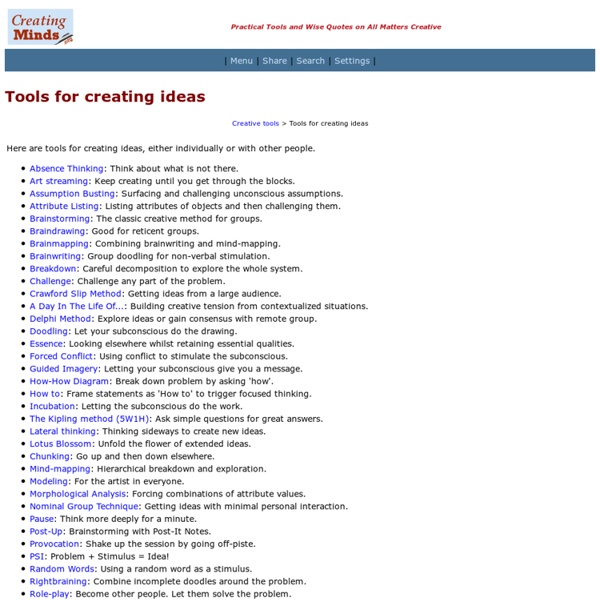



http://creatingminds.org/tools/tools_ideation.htm
Related: humanities • Tools • INTELLIGENTIA • To ViewHuman Potential Movement The Human Potential Movement (HPM) arose out of the milieu of the 1960s and formed around the concept of cultivating extraordinary potential that its advocates believed to lie largely untapped in all people. The movement took as its premise the belief that through the development of "human potential", humans can experience an exceptional quality of life filled with happiness, creativity, and fulfillment. As a corollary, those who begin to unleash this assumed potential often find themselves directing their actions within society towards assisting others to release their potential. Adherents believe that the net effect of individuals cultivating their potential will bring about positive social change at large. Roots[edit] The movement has its conceptual roots in existentialism and humanism.
Inspiration Pad Pro v2.0 Inspiration Pad Pro v3.0"Endless Inspiration!" Inspiration Pad Pro is a program you can use to generate all sorts of things for your campaign. Generate names, town information, encounters, treasures - you name it! The Selective Laziness Of Human Reasoning : 13.7: Cosmos And Culture Gary Waters/Getty Images/Ikon Images Democrat: "Those arguments by Republicans are preposterous!" Republican: "Those arguments by Democrats are absurd!" Sound familiar? 10 Brilliant Social Psychology Studies Ten of the most influential social psychology experiments. “I have been primarily interested in how and why ordinary people do unusual things, things that seem alien to their natures.Why do good people sometimes act evil?Why do smart people sometimes do dumb or irrational things?” –Philip Zimbardo
Write to Done Arouse your creativity Electric flesh-arrows … traversing the body. A rainbow of color strikes the eyelids. Humanistic psychology Humanistic psychology is a psychological perspective which rose to prominence in the mid-20th century in response to the limitations of Sigmund Freud's psychoanalytic theory and B.F. Skinner's behaviorism.[1] With its roots running from Socrates through the Renaissance, this approach emphasizes individuals inherent drive towards self-actualization and creativity. It typically holds that people are inherently good. It adopts a holistic approach to human existence and pays special attention to such phenomena as creativity, free will, and human potential. It encourages viewing ourselves as a "whole person" greater than the sum of our parts and encourages self exploration rather than the study of behavior in other people.
RISORSE E LIBRARY PER LA VOSTRA CREATIVITA’ 38 Shares Facebook 35 Twitter 2 LinkedIn 1 inShare1 Google+ 0 Email -- Email to a friend 38 Shares × Ecco qui una serie di link utili, suddivisi per tipologia, che vi consentiranno di creare lavori di altissimo livello, senza rischiare di violare le norme in materia di copyright. Qui trovate una serie di link per musiche ed effetti sonori liberi da copyright:
What If Consciousness Comes First? Source: ColiN00B/Pixabay Despite the success of neuroscience in establishing a wide range of correlations between brain processes and conscious experience, there is at least one question about the relationship between the brain and consciousness that continues to appear unanswerable, even in principle. This is the question of why we have conscious experience at all. article continues after advertisement The problem is that there could conceivably be brains that perform all the same sensory and decision-making functions as ours but in which there is no conscious experience.